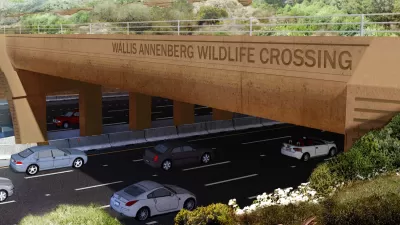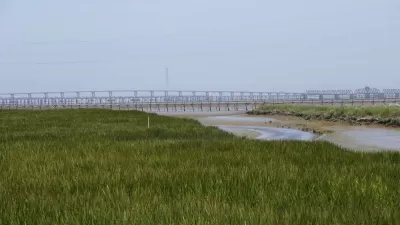The world’s coastal cities now face an impossible situation as a result of climate change. While the impacts and catastrophes become inevitable, why do cities like San Francisco dither rather than act?
Gabriel Metcalf makes an impassioned plea for more action on global climate change: “The international community has set a goal of limiting global warming to fewer than 4 degrees Fahrenheit. That is the current consensus of the upper limit to avoid catastrophic climate change. Achieving it would require the total cessation of emissions once we have spirited 800 gigatons of carbon out of the ground and into the air. By 2011, we were already two-thirds of the way to this threshold, and global emissions rates continue to increase.”
Metcalf also says it's possible to measure how successful humans have been in preventing the worst possible outcomes by how much fossil fuel we avoid using: “To keep warming below 4 degrees Fahrenheit, the International Energy Agency has found that we need to leave two-thirds of all known remaining reserves of coal, oil and gas in the ground, unburned.”
“There is a name for the new geological epoch we have entered: the Anthropocene, the era in which humans have caused profound changes to the outer layer of the earth,” writes Metcalf, who rather suggests a name for the era coined by author Kim Stanley: “The Dither.” The article then goes on to highlight some of the investments required in infrastructure to adapt to the inevitable consequences of climate change.
Of particular relevance to the planning and development process, Metcalf calls out the hypocrisy of those with environmentalist politics who nonetheless obstruct urban development: “[While] the Bay Area needs to channel all of its growth into walkable, transit-served locations, we still endlessly debate the merits of every individual building no matter how close to transit it is. If you believe that there is time urgency to cutting the American contribution to global climate change, the current system of endless process over action constitutes a moral failure.”
FULL STORY: The Great Dithering

Pennsylvania Mall Conversion Bill Passes House
If passed, the bill would promote the adaptive reuse of defunct commercial buildings.

World's Largest Wildlife Overpass In the Works in Los Angeles County
Caltrans will soon close half of the 101 Freeway in order to continue construction of the Wallis Annenberg Wildlife Crossing near Agoura Hills in Los Angeles County.

U.S. Supreme Court: California's Impact Fees May Violate Takings Clause
A California property owner took El Dorado County to state court after paying a traffic impact fee he felt was exorbitant. He lost in trial court, appellate court, and the California Supreme Court denied review. Then the U.S. Supreme Court acted.

Coming Soon to Ohio: The Largest Agrivoltaic Farm in the US
The ambitious 6,000-acre project will combine an 800-watt solar farm with crop and livestock production.

New York’s Deadliest Neighborhoods for Pedestrians
Pedestrian deaths rose last year, but remain below pre-2020 levels.

Eviction Looms for Low-Income Tenants as Rent Debt Rises
Nonprofit housing operators across the country face almost $10 billion in rent debt.
City of Costa Mesa
Licking County
Barrett Planning Group LLC
HUD's Office of Policy Development and Research
Mpact Transit + Community
HUD's Office of Policy Development and Research
Tufts University, Department of Urban and Environmental Policy & Planning
City of Universal City TX
ULI Northwest Arkansas
Urban Design for Planners 1: Software Tools
This six-course series explores essential urban design concepts using open source software and equips planners with the tools they need to participate fully in the urban design process.
Planning for Universal Design
Learn the tools for implementing Universal Design in planning regulations.


























